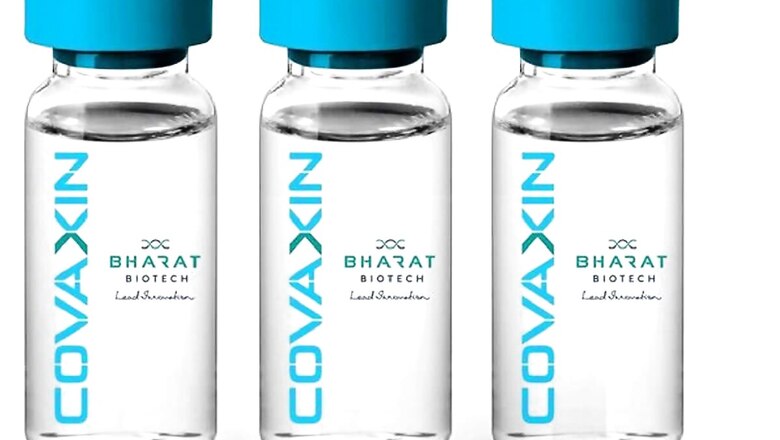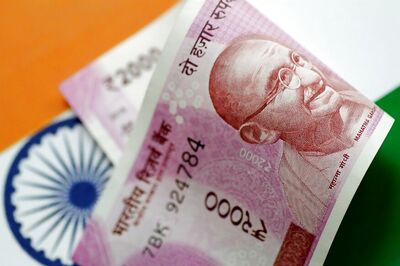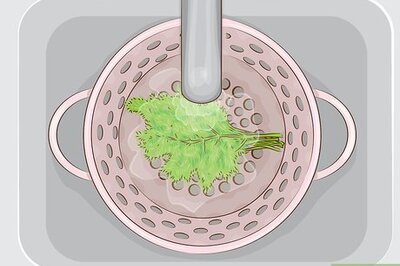
views
India’s time for leadership is here—and yes, that time for leadership does indeed begin in the midst of the horrible crisis we are living through at the moment, where everything seems bleak and hope seems too far away. India needs to lead by example and relax the patent for Covaxin, the domestic COVID-19 vaccine developed and manufactured by Bharat Biotech in India.
No, this isn’t some feeble-minded socialist dream sequence where the author, an unapologetic supporter of free markets, has “seen the light” and turned towards socialism policies. Far from it, the relaxation of Covaxin’s patent brings tangible benefits to Indians, the world, and most importantly, the manufacturer Bharat Biotech. If properly done (and admittedly in India it is a big if), it sets a global best practices paradigm, combining IPR relaxation, government-corporate cooperation, pandemic management, and optimal long-term capitalism.
Why We Must Do This
The first question is why should we do this, and the second is how should we go about doing this. Of all the vaccines manufactured in India, Covaxin has the lowest production run and Bharat Biotech the lowest global coverage. An immediate Intellectual Property Right (IPR) relaxation before any western company does this provides a massive first-mover’s advantage to Bharat Biotech. In the short term, it kick-starts production of the vaccine in bulk and creates economies of scale without needing the company to invest in an expensive expansion of capacity.
Given the small market share of Covaxin, any expansion of local capacity at the manufacturer’s own cost is a high-risk proposition. Creating other manufacturers globally not only mitigates the risk for the company, but also reduces costs from three different angles. First due to bulk, second due to shortened supply chains and associated logistics cost for the target region and third because it removes the need for India to pay royalties externally. Such an expansion of capacity funded by recipient nations or groupings can then be worked into an import agreement as realistically speaking India will be the biggest consumer.
ALSO READ | By Mid-June & Early-July, India Will Have Enough COVID Jab Supply: Scientist Virander S. Chauhan
In the bigger picture, this immediately opens up new markets for the company—not for the generic knockoffs that Indian pharma produces, but for its mature cutting-edge made-in-India research. Consider this, after all the vile tactics Pfizer has used, the availability of a fantastic world-class product with an open license would be extremely attractive for several countries, and regional groupings. In effect, while the IPR relaxation doesn’t provide immediate “direct market access”, it provides something far more valuable in the long-term—a big-ticket calling card for Bharat Biotech, ensured direct access to foreign governments and their health departments. The best part is this would come with a solid reputation as a sterling company that helped out at the time of need and did so in an ethical and transparent fashion.
It is important to note here that most countries don’t have a turnkey pharma industry just waiting around idly to absorb technology. It requires training and equipment and this would create ancillary markets for Bharat Biotech. How it chooses to proceed with the hand-holding process would mean its board could choose to open up a profitable pharma-education parallel and a pharma equipment parallel, or it could outsource it to other Indian companies creating significant new business. It is important to remember here that these recipient countries aren’t simply going to become pharma independent overnight. India’s pharma expertise has taken nearly 40 years to blossom to this level. So, in the process of making the recipient country “pharmaceutically independent”, you create meaningful long-term interdependencies that Bharat Biotech can bank on for several decades to come. After all, who will these countries and regional groupings trust for their future pharma needs? A company that helped them when required and did so meaningfully and ethically, or companies like Pfizer that kicked them when they were down? Over the long term, the vast new additional markets will create the economies of scale to fuel the research and development wing of Bharat Biotech and begin the transformation of the Indian pharma sector from copiers to pioneering innovators as it moves up the value chain.
If you want examples of this, look no further than how TVS has penetrated the South American automobile market or Airtel the African telephony market. Each company piggybacked on the reputation Indian businesses have, their ethical practice and behaviour specifically contrasted with Western rapaciousness and Chinese predation and market distortion. It would be no exaggeration to say that TVS and Airtel have done more for India’s foreign policy goal of containing China than the foreign ministry and its “MoU” extravaganzas have.
How to Do It
The ‘How’ bit is critical—because given India’s own clumsy attempts at press-ganging its private sector, the way this process is managed will be critical and needs to be done in a way that respects the best interests of Bharat Biotech and its shareholders. It is easy to argue that since the government had provided the initial funding to kick-start research into Covaxin, the IPR belongs to the Indian Union. This is a dangerous and deeply destructive argument—one that will kill the bright spark of innovation in our pharma sector. You simply cannot railroad Bharat Biotech’s management.
ALSO READ | Traditional Systems Have Failed the Pandemic Test. India Needs a Distributed Model That Has Compassion
Optimally, the process should involve incentives and compensation provided by the government to the company through a consultative process with the company’s management, which then tailors it in a way that accounts for direct, indirect and opportunity costs. For example, if India relaxes the IPR, it could do so for a 2 to 5-year window, depending on Bharat Biotech’s own assessment of how long it will take for the pandemic wave to subside and for the vaccine to become part of a routine annual vaccination process as opposed to a desperate fight against a killer pandemic.
After that point, it needs to ensure agreements where Bharat Biotech gets its royalties on the original as well as on localised derivatives after the IPR relaxation period ends, and negotiate agreements with licensees for a first right of refusal for Bharat Biotech in any derivatives that may be developed.
As a breakout pharma innovation nation, it is important we do not get bogged down in the business dogmas of established pharma giants and their counterproductive short-term obsession with IPR. As the “little guy”, we need innovative strategies to get our companies their international market share. At the same time, we need to do it without sentimental socialism that alarms big pharma and creates a backlash but also ends up disincentivising local innovation. Ultimately calibration here is key—not ham-handed and self-destructive socialism. We need to internalise the fact this is not just great altruism, but great business.
Read all the Latest News, Breaking News and Coronavirus News here. Follow us on Facebook, Twitter and Telegram.



















Comments
0 comment